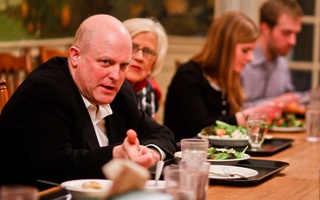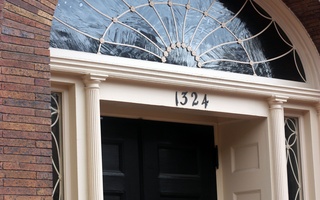While the sticky floors at Toad’s Place may seem a world away from the granite walls of University Hall, the New Haven nightclub frequented by Yale students has been a topic of some discussion among Harvard administrators this year.
As debates around House life, party space, and social clubs have reached a fever pitch this year, Yale has emerged as a potential model in the College’s efforts to recenter social life in the Houses and on campus.
{shortcode-a1acb2f1e9040fbe69f4e4994da48ad621263d7a}Discussions of Yale’s residential set-up have been particularly prevalent in the administration’s communications with members of Harvard’s non-affiliated single-gender social clubs. An official write-up of meeting notes between Associate Dean of Student Life David R. Friedrich and graduate and undergraduate leadership of final clubs, and a set of emailed recommendations from Lowell House resident tutor Eli B. Schachar offer insight into how administrators and the clubs have turned to Yale as a potential model for the College’s social scene.
“Freshmen guys are resigned to ‘stay in their rooms playing video games and pining of the day they’ll be in the Clubs,’” Schachar wrote in the email, quoting leaders of undergraduate clubs he spoke with, adding that Yale is perceived as “a more fun and socially inclusive college experience.”
Schachar said in an interview that he began meeting with several presidents of both male and female clubs shortly after an August meeting between a number of Lowell tutors and Dean of the College Rakesh Khurana. According to Schachar, Khurana urged the tutors to use their role as “near-peers” to the undergraduate leaders to discuss ways that the administration and the clubs could make Harvard “more inclusive.”
The common theme of his meetings with five all-male and three all-female clubs, Schachar said, was a perception that final clubs are a “symptom” of what leaders called the College’s subpar social scene. After hearing the clubs’ concerns, Schachar, drawing from his own undergraduate experience at Yale, wrote an email to Khurana, Friedrich, and then-Dean of Student Life Stephen Lassonde early last semester.
His message outlined “five changes the administration can pursue” to improve social life at Harvard. Schachar advocated creating a “designated party space,” similar to Toad’s, and preserving in-suite common rooms in subsequent house renovations, as opposed to the hallway common rooms in parts of Quincy’s Stone Hall, Leverett’s McKinlock Hall, and Dunster House that have drawn some criticism. He also suggested randomizing students into their house before freshman move-in, similar to how students are put into Residential Colleges at Yale, and, introducing more social activities for freshmen.
Prefaced by the words “most controversial,” he finally recommended abolishing the residential tutor system in favor of an undergraduate RA model.
All five of Schachar’s suggested policies are currently in place at Yale.
“Some of what I suggested are dramatic changes, and because of space and other constraints, I’m not even sure what’s possible,” Schachar said.
In his response to Schachar, Khurana wrote that the administration had heard “similar suggestions from other students,” adding that “the suggestions you are making are something we would have to do in a process that engages our entire community.
During his tenure as the College’s top administrator, Khurana has focused heavily on social life at the College, critiquing single-gender groups and practices he deems “exclusive.” Behind closed doors, administrators have increasingly pressured male final clubs to admit women, and for the centuries-old institutions to rethink selection processes.
{shortcode-4be17e73939630e6b4d901157aa394ba22b659c7} Schachar’s policy recommendations mirror similar proposals that administrators and final clubs discussed during meetings final club graduate and undergraduate leadership. Friedrich declined to comment on the status of any policy changes and Khurana could not be reached for comment.
At least two of Schachar’s suggestions were also brought up at spring 2015 meetings with graduate and undergraduate final club leaders. Friedrich’s meeting notes, from a Mar. 30, 2015 meeting with undergraduate leadership and a May 6 meeting with graduate leadership, also mention Toad’s by name and suggest improvements to the first-year social experience.
"The social isolation of the first year also appears to feed the growing fraternity and sorority culture as students seek a sense of belonging and connection to upper-class students,” administrators included in the notes, which were obtained by The Crimson.
The notes, watermarked “Confidential — Not for Distribution,” are divided into two sections: “potential changes to final club policies” and “potential College administration-led social initiatives.”
Among the potential College actions listed were expanding social programming at the Queen’s Head pub, streamlining the party registration process, finding a “Harvard equivalent” to Toad’s, and “re-center[ing]” social life in the houses.
Among the potential changes to club policies were the institution of guest-only policies, shortening initiation processes, replacing punch with an “open application” system, and allowing co-ed membership.
In the fall, both the Spee and the Fox added women to their ranks. Though Khurana has kept quiet on his involvement in these changes, dozens of Fox club leadership emails obtained by The Crimson indicate an acute fear of increased administrative oversight on all-male final clubs. Fox club undergraduates framed the concern in their letter to graduates as a prominent factor in their decision to go co-ed.
Administrators have already implemented some of the suggestions from Friedrich’s notes and Schachar’s email by attempting to revamp freshmen social life. The College has also introduced more programming in the Queen’s Head Pub has also been part of the administration’s effort to bolster social spaces on campus.
While Dean of Yale College Jonathan Holloway wrote in an email that he and Khurana “have profited from sharing experiences and ideas” in the past, Holloway did not elaborate on any potential changes to Harvard’s residential set-up or social life.
Then-presidents of six final clubs who met with Schachar either declined or did not respond to request for comment.
—Staff writer C. Ramsey Fahs can be reached at ramsey.fahs@thecrimson.com. Follow him on Twitter @ramseyfahs.
Read more in College News
Karvonides Clarifies ‘Unwelcome Conduct’ StandardsRecommended Articles
-
 Professor Discusses the Challenges of Policy-Making and Climate Change
Professor Discusses the Challenges of Policy-Making and Climate Change -
 In Most Extensive Comments in Centuries, Porcellian Club Criticizes Final Club Scrutiny
In Most Extensive Comments in Centuries, Porcellian Club Criticizes Final Club Scrutiny -
 In Tense Meeting, Khurana Floats Possible Sanction for Final Clubs
In Tense Meeting, Khurana Floats Possible Sanction for Final Clubs -
 In Historic Move, Harvard to Penalize Final Clubs, Greek Organizations
In Historic Move, Harvard to Penalize Final Clubs, Greek Organizations -
 A Social Dean
A Social Dean













